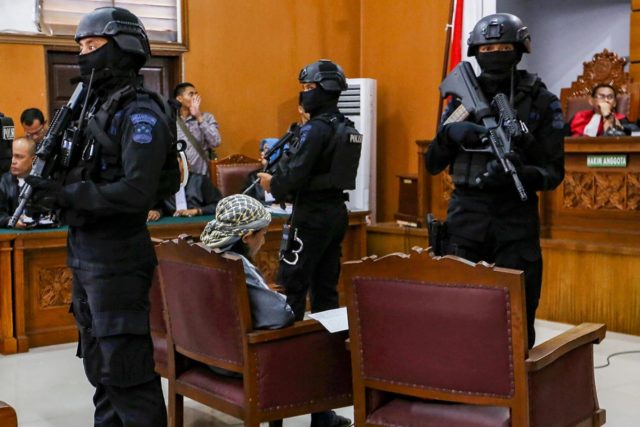
Briefs
Publication: Terrorism Monitor Volume: 16 Issue: 13
By:

Syria: Government Forces Move on the South
Syrian government forces have begun their assault on parts of Syria’s southwest, effectively ending a ceasefire agreement in place since last year and raising fears that Iranian-backed fighters could be left to infiltrate the area.
In the weeks before launching their campaign to regain control of the territory, Syrian government forces massed in the governorates of in al-Quneitra and Daraa (Haaretz, June 24; AMN, June 25; Gulf Today, June 25). Following intensified aerial bombardment, regime forces moved into eastern Daraa, capturing the villages of al-Bustan and al-Shumariya and moving on to the strategic town of town of Busra al-Hariri (Asharq al-Awsat, June 24).
Alongside its Iranian backers, the Syrian forces have trumpeted their successes against fighters with Hayat Tahrir al-Sham and Islamic State (IS) (SANA, June 21; SANA, June 24). However, the jihadists only control relatively small amounts of territory in the southwest. Other fighters are with rebel groups such as Jaish al-Thawra, an alliance of Sunni groups that came together in 2016 that fights as part of the Free Syrian Army (FSA), and these will be the regime’s real targets.
Quneitra and Daraa are part of a de-escalation zone that was agreed between the United States, Russia and Jordan in July last year (al-Jazeera, July 9, 2017). The agreement had the effect of freezing the conflict in the area. Since then, however, the “southern front” has to an extent been forgotten, and a U.S. decision to end support for the rebels there has left them in a precarious position.
The de-escalation deal is in tatters, but the implications of the Syrian assault could be even more damaging. Jordan fears that renewed fighting will push more refugees into its territory. The Kingdom is already struggling with more than 600,000 refugees from the Syrian conflict, according to UN figures. It is locking down its border.
Meanwhile, Israel—effectively a silent partner to the de-escalation deal since the region touches the Israeli-occupied Golan Heights—also has concerns. Since 2013, Israel has conducted a humanitarian assistance mission at the border and in the areas adjacent to the Golan (Time of Israel, July 19, 2017). Treating the wounded and providing food, baby formula and medical supplies is, however, not the extent of Israel’s involvement—it also backs rebel factions, including Liwaa Fursan al-Jolan and Firqat Ahrar Nawa (Jerusalem Post, July 6, 2017). It fears the Syrian assault could mean an influx of Iran-backed militias to the area. It will want to keep them at a safe distance. If the rebels cannot do that, it raises the possibility of some form of direct Israeli intervention.
Russian air support has given the regime an advantage in its efforts to reclaim territory elsewhere in Syria, and it will likely do so again here. The United States has indicated it does not plan to intervene. It may be possible to obtain assurances that Iranian elements will be withdrawn after the assault—such an agreement might be enough to avoid further escalation of the conflict, but it is unlikely to be enough to ensure long-term stability in Syria’s southwest.
Indonesia: Gains for the Moderates
Indonesia’s provincial elections have taken place amid heightened security in the wake of a series of militant attacks. However, not only have the elections passed without incident, early indications suggest that the votes have fallen more in favor of political moderates than Islamist conservatives.
Security was tight going into the polls, with more than 170,000 security force personnel deployed to polling stations across 171 regions (Xinhua, June 26; Firstpost, June 27). Intelligence agencies had warned that known extremist groups were likely planning attacks. In the end, however, the elections concluded without disruption, despite reports of violence by suspected separatists in Papua (Jakarta Post, June 28).
The unease ahead of the polls in the world’s largest Muslim-majority nation was understandable, with the country stunned after a series of Islamic State-inspired suicide attacks that killed more than 30 people (see Terrorism Monitor, June 2). The elections also followed on the heels of the sentencing of Aman Abdurrahman, the de facto leader of the Islamic State (IS) affiliate Jamaah Ansharut Daulah (JAD) (Jakarta Post, June 22). Abdurrahman was sentenced to death for inciting others to commit terror attacks, including the attack by gunmen and suicide bombers in Jakarta in January 2016. He denied his teachings were behind that attack, although over the course of his trial admitted that he had urged his followers to travel to Syria to join IS (Jakarta Post, May 30).
Ahead of the elections, another Islamist cleric also featured heavily in the Indonesian media, albeit for different reasons—an investigation into alleged violations of Indonesia’s pornography laws was dropped against Habib Rizieq Shihab, the founder of the Islamic Defenders Front (FPI) (Tempo, June 18; NNC, June 17). Supporters of the FPI founder said the case against him had been manufactured for political reasons. The cleric has been in Saudi Arabia since the claims emerged in 2017, apparently unwilling to return to Indonesia, and still has several outstanding police complaints against him (Jakarta Post, April 25, 2017).
Rizieq’s Islamist vigilante group had a considerable impact on last year’s Jakarta gubernatorial race, fomenting outrage over the alleged blasphemy of Jakarta’s then-incumbent Chinese-Christian governor and successfully pushing for him to be jailed. In that context, Islamists had appeared increasingly assertive going into this year’s elections, with analysts presenting the vote as a test for the moderate President Joko Widodo, who has pledged to protect Indonesia’s pluralist traditions.
Early indications have been that the president’s allies have found favor, including in West Java, the country’s most populous province and a traditional stronghold for Islamic conservatives (NewsAsia, June 27; Nikkei, June 27). West Java has been the province to watch—success there could line things up for Widodo if, as expected, he stands in next year’s presidential election.




